Geneva still fuming over Libyan apology
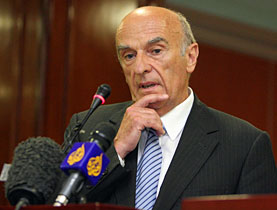
Passions are still running high in Geneva over President Hans-Rudolf Merz's apology to Libya for the "unjustified" 2008 arrest of one of Moammar Gaddafi's sons.
swissinfo.ch went to find out what people in Geneva feel about the agreement to end a year-long standoff that has frozen Swiss-Libyan business ties and left two Swiss businessmen marooned in Tripoli.
“Humiliation”, “scandal” and “shocking” are some of the more common words and phrases still being heard on the streets of Geneva just three days after the Swiss president’s visit to Libya.
“I think it’s scandalous; Merz should never have done that, especially as he went of his own initiative,” said Line Rennwald, a political science student at Geneva University.
Postman Ernesto Codorello also felt the Swiss president should never have apologised to the Libyans.
“We should have brought criminal proceedings against the Libyan authorities for detaining the two Swiss, who did nothing. The Libyans are the criminals and they should be the ones to apologise.”
“I don’t think he did something very good for Swiss citizens,” said student Lucien Salmon. “Switzerland is going to find itself increasingly isolated.”
Relations between the countries have been strained since July 2008 when Hannibal Gaddafi and his pregnant wife were arrested in Geneva, charged with assaulting two domestic employees.
The couple were freed after two days in custody on bail of SFr500,000 ($470,000) and the charges were later dropped, when the employees withdrew their complaint and were compensation.
However, Libya responded by suspending oil deliveries to Switzerland, withdrawing assets worth an estimated $5 billion (SFr5.3 billion) from Swiss banks, ending bilateral cooperation programmes and placing restrictions on Swiss companies.
On August 20 the Swiss finance ministry said the two countries would set up an independent arbitration panel to look into the circumstances surrounding the arrest, and that Switzerland was “prepared to apologise for the unjustified and unnecessary arrest of Hannibal Gaddafi and his family by the Geneva police”.
“Merz doesn’t speak very good French and got it mixed up,” said an elderly lady in the Parc des Bastions. “He gave them our apologies, while regrets were sufficient.”
Up in arms
The media and politicians have criticized Merz for returning without the businessmen, and with only a verbal pledge that they would be allowed out by September 1. On that day Libya will be marking the 40th anniversary of Gaddafi’s coming to power, and is expecting to grant amnesties to a number of prisoners.
In a poll in the Tribune de Genève newspaper, 80 per cent of the 4,000 respondents said Merz was wrong to apologise to Libya.
Geneva’s regional government – which is responsible for policing under Switzerland’s decentralized system – has rebuffed the federal president’s deal with Libya and stands by the canton’s police force and “independent” judiciary.
On Monday cantonal president David Hiler said the regional government was “up in arms” and “shocked by the improvised nature of the agreement reached with Libya”.
Hiler said Switzerland did not have to combine apologies with independent arbitration, which does not conform with Swiss law.
He added he was pleased to see that cabinet members, lawyers, the media and the general public shared their concerns.
“Merz shouldn’t have interfered in Geneva cantonal affairs,” said banker Eddy Baumann. “And he took an initiative which was not his right as he didn’t ask cabinet colleagues. Just because you are president doesn’t give you all the rights.”
Surprise
Lawyer Christian Ferrazino, the former mayor of Geneva, also said he was surprised by Merz’s way of working.
“He violated government collegiality. It’s surprising that a president can act in such an non-collective manner when you know that the foreign ministry has been working on this for a year,” he said.
Signing an agreement indicating that the canton had acted in an unjustified manner was already recognizing its guilt before the court’s verdict, the lawyer said.
“Not only is Merz not a very good negotiator, but he’s apparently a very bad lawyer. It’s worrying as he is in a position to take decisions on behalf of our country,” said Ferranzino.
Despite the general tone of disapproval, a number of people felt Switzerland had been left with no other solution but to apologise.
“Basically Merz had no choice. Although it hurts to kneel before a dictatorial country like Libya, we didn’t have much choice as there were two hostages,” said Geneva banker A.B. (name withheld).
“Switzerland is not a superpower. If it were part of the European Union it could’ve done something with the pressure of its allies, but we want to be alone so we have to adopt a strategy of apologising,” said Geneva University student Alexandre Ferrara.
Simon Bradley in Geneva, swissinfo.ch
July 15, 2008: Hannibal Gaddafi and his wife Aline are arrested at a Geneva hotel after police receive reports that they have mistreated two servants.
After two nights in detention, the couple are charged with inflicting physical injuries against the servants. The Gaddafis are released on bail and leave Switzerland.
July: Two Swiss nationals are arrested in Libya. Swiss businesses are forced to close their offices and the number of Swiss flights to Tripoli is cut.
July: Bern forms a task force and sends a delegation to Libya. Two Swiss nationals arrested in Libya are released from jail.
August: A Libyan delegation is in Switzerland for talks.
October: Libya cuts its own airline’s flights to Switzerland.
December: Swiss International Air Lines can no longer fly to Tripoli.
January 2009: Talks are held with Seif al-Islam Gaddafi, one of the Libyan ruler’s sons. A diplomatic delegation travels to Tripoli.
April: Hannibal and his wife, along with the Libyan state, file a civil lawsuit against the Geneva authorities in a Geneva court.
May: Foreign Minister Micheline Calmy-Rey returns from a visit to Libya. She says “significant progress” is made. Efforts are underway to arrange a meeting between President Hans-Rudolf Merz and Libyan leader Moammar Gaddafi.
June: Libya withdraws most of its assets from Swiss bank accounts.
August: Merz, who meets the Libyan prime minister but not Gaddafi, apologises in Tripoli for the arrest.

In compliance with the JTI standards
More: SWI swissinfo.ch certified by the Journalism Trust Initiative

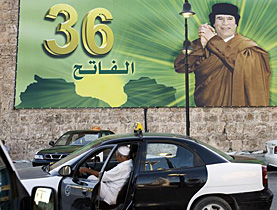
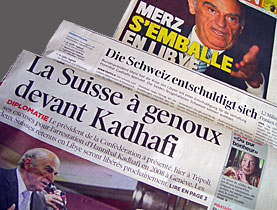
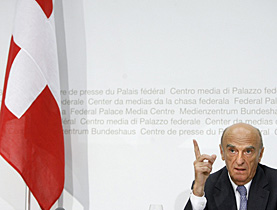
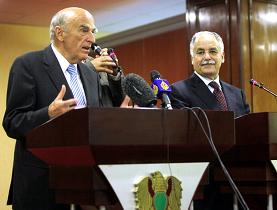
You can find an overview of ongoing debates with our journalists here. Please join us!
If you want to start a conversation about a topic raised in this article or want to report factual errors, email us at english@swissinfo.ch.